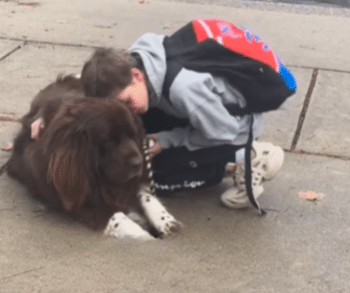Newfoundlands are known for their gentle temperament, immense loyalty, and impressive instincts. Their deep bond with family often positions them as more than just pets—they become protectors who seem to know when something isn’t quite right. A recent story that captured hearts across social media involves a Newfoundland who steadfastly refused to escort his young human companion to school—a refusal that, at first glance, appeared to be simple stubbornness. However, what unfolded later revealed something far more meaningful.
In a viral video, a black and white Landseer Newfoundland is seen standing immobile on the sidewalk. As his young owner tries to coax him down the path toward school, the massive dog doesn’t budge. His sheer size makes it impossible for the boy to move him, and the dog offers only a knowing side glance—as if saying, “Something’s not right today.”
The boy’s mother, who managed to capture the peculiar standoff on camera, laughed off the situation initially. She assumed this was just another classic case of Newfoundland stubbornness. But mere hours later, the family received a call from the school—the young boy had fallen ill with a stomach bug and needed to come home immediately.
This left the family wondering: Had their loyal dog sensed something amiss that they couldn’t see?
It turns out that such behavior isn’t uncommon among dogs, especially those with strong bonds to the people they love. Dogs have an incredible sense of smell—studies estimate their olfactory abilities are between 10,000 and 100,000 times more acute than humans. This heightened sense allows them to detect changes in human scent that are far too subtle for us to perceive.
Medical science supports the idea that dogs can detect numerous health conditions, often before humans even show symptoms:
- Cancer detection – Some dogs have been trained to identify cancer by odor alone.
- Diabetes alert – Dogs can recognize dangerous changes in blood sugar, alerting their owners before severe symptoms occur.
- Seizure prediction – Seizure alert dogs are able to detect the onset of seizures, thanks to behavioral and scent-based cues.
- Infectious disease detection – Recent studies show dogs can even detect COVID-19 through scent.
Some dogs undergo specialized training to detect these changes, but others, like the heroic Newfoundland in this recent incident, act on instinct alone. In this case, it’s likely that the dog sensed odor changes in the child that indicated something was off—even before physical symptoms arose.
Even without formal training, dogs are deeply attuned to the routines and emotional states of their families. Their ability to notice subtle shifts in smell, energy, and behavior makes them excellent at catching the early signs of illness or distress in their humans. In this scenario, the dog’s refusal to move wasn’t an act of defiance—it was an instinctive act of protection.
Footage of the moment continues to circulate online, raising intriguing questions about how much our canine companions truly perceive. The dog’s expression in the video, shared on Instagram, has left many viewers convinced that this wasn’t mere coincidence—but rather a powerful display of animal intuition and love.
As more stories surface of dogs acting unusually before their humans fall ill, researchers continue to explore the full potential of canine sensory perception. It’s likely that in time, science will better explain what many dog families already suspect: that their four-legged companions really do have a sixth sense when it comes to their loved ones.
In this unforgettable display of loyalty, the Newfoundland’s mysterious behavior was anything but random. It serves as a poignant reminder that when a dog acts out of the ordinary, it’s often worth paying closer attention—not all warnings barked are loud.










Facebook Comments